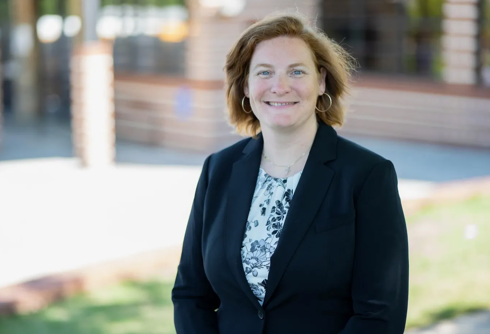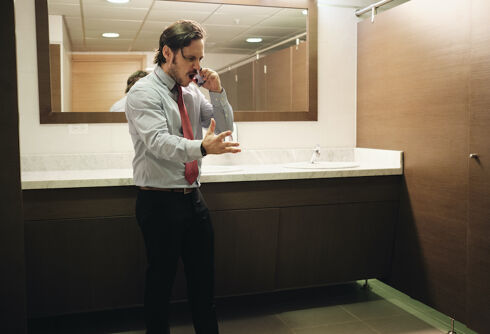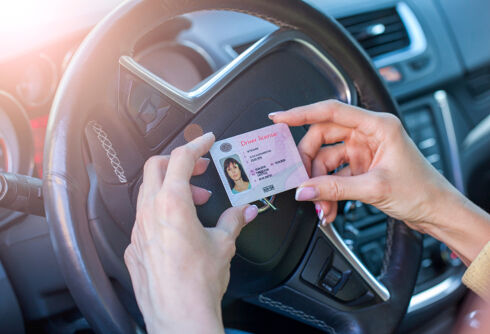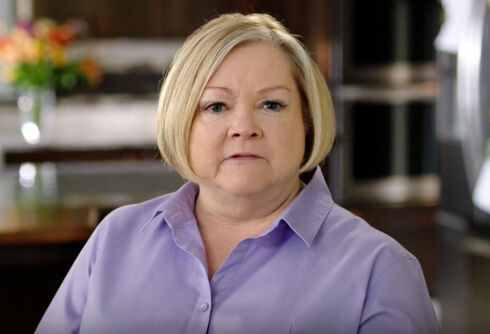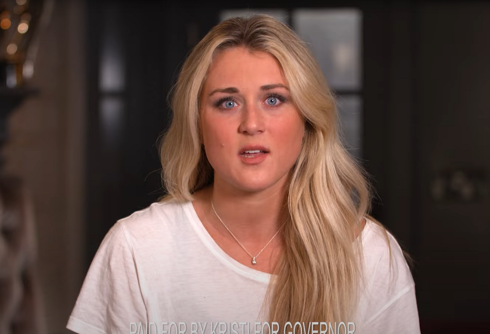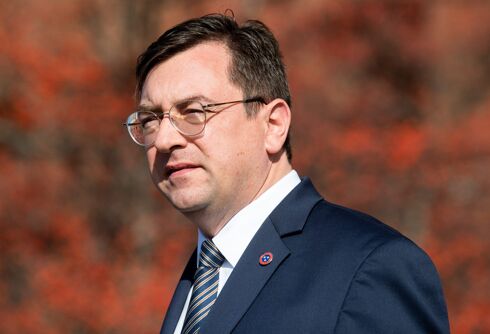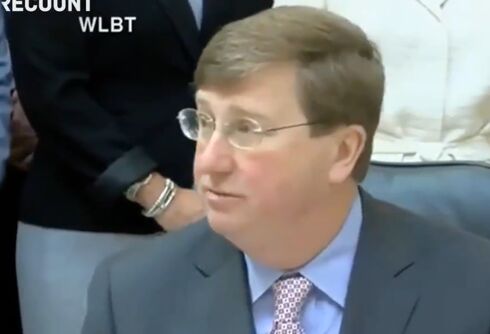
Spencer Geiger, left, of Virginia Beach, and Carl Johanson, of Norfolk, hold signs as they demonstrate outside Federal Court in Norfolk, Va., Tuesday, Feb. 4, 2014. A federal judge heard arguments on whether Virginia’s ban on gay marriage is unconstitutional.
Updated: Friday, 2/14/2104 – 10:00 a.m. EST
NORFOLK, Va. — Virginia on Thursday became the first state in the South to have its same-sex marriage ban overturned, with a late-night federal court ruling that declared the voter-approved amendment unconstitutional.
U.S. District Judge Arenda Wright Allen issued a stay of her order while it is appealed, meaning that gay couples in Virginia still won’t be able to marry until the case is ultimately resolved. Both sides believe the case won’t be settled until the Supreme Court decides to hear it or one like it.


Plaintiffs in the Bostic v. Rainey case, Tony London, waves to the crowd as he and his partner, Tim Bostic, right, leave Federal Court after a hearing on Virginia’s ban on gay marriage in Norfolk, Va., Tuesday, Feb. 4, 2014.

Carol Schall (left) and Mary Townley at their home in Richmond, Va. The couple, who were married in California in 2008, joined the lawsuit challenging Virginia’s ban on same-sex marriage.
Allen’s decision echoes recent rulings elsewhere in the U.S. and is the strongest foothold yet in the South for the gay-marriage movement. On Wednesday, a judge declared that Kentucky must recognize same-sex marriages performed in other states, but didn’t rule on the constitutionality of whether such marriages can be performed in the state.
Never Miss a Beat
Subscribe to our newsletter to stay ahead of the latest LGBTQ+ political news and insights.
Decisions similar to that of the Virginia judge have been issued in in Utah and Oklahoma federal courts.
The office of newly elected Virginia Attorney General Mark Herring took the unusual step of not defending the law because it believes the ban violates the equal protection clause of the 14th Amendment. In her ruling, Wright Allen agreed.
“The court is compelled to conclude that Virginia’s Marriage Laws unconstitutionally deny Virginia’s gay and lesbian citizens the fundamental freedom to choose to marry. Government interests in perpetuating traditions, shielding state matters from federal interference, and favoring one model of parenting over others must yield to this country’s cherished protections that ensure the exercise of the private choices of the individual citizen regarding love and family,” Wright Allen wrote.
The plaintiffs’ lead co-counsel, Theodore B. Olson, said in a statement: “Through its decision today, the court has upheld the principles of equality upon which this nation was founded.”
Wright Allen’s stay was requested by the Virginia Attorney General’s Office to avoid a situation similar to what happened in Utah after that state’s ban on gay marriages was declared unconstitutional.
More than 1,000 gay and lesbian couples were married in the days after the ruling until the U.S. Supreme Court granted the state an emergency stay, halting the weddings and creating a cloud of uncertainty for the status of the married couples. Soon after, a federal judge also declared Oklahoma’s ban unconstitutional. That ruling also is on hold while it is appealed.
“The legal process will continue to play out in the months to come, but this decision shows that Virginia, like America, is coming to a better place in recognizing that every Virginian deserves to be treated equally and fairly,” Herring, a Democrat, said in a statement.
Supporters of the state ban on same-sex marriages issued statements decrying Wright Allen’s ruling.
“It appears that we have yet another example of an arrogant judge substituting her personal preferences for the judgment of the General Assembly and 57 percent of Virginia voters,” said Tony Perkins, president of the conservative Family Research Council. “Our nation’s judicial system has been infected by activist judges, which threaten the stability of our nation and the rule of law.”
Brian Brown, President of the National Organization for Marriage, called the ruling “another example of an Obama-appointed judge twisting the constitution and the rule of law to impose her own views of marriage in defiance of the people of Virginia.”
“There is no right to same-sex ‘marriage’ in the United States constitution,” Brown said. “In fact, the U.S. Supreme Court has said that states have the pre-eminent duty of defining marriage. The people of Virginia did just that in voting overwhelmingly to affirm marriage as the union of one man and woman. That decision should be respected by federal judges and we hope that the U.S. Supreme Court end s up reversing this terrible decision.”
In a movement that began with Massachusetts in 2004, 17 states and the District of Columbia now allow gay marriage, most of them clustered in the Northeast. None of them is in the old Confederacy.
The Virginia case centered on a gay Norfolk couple, Timothy Bostic and Tony London, who were denied a marriage license by the Norfolk Circuit Court on July 1, shortly after the Supreme Court struck down parts of the federal Defense of Marriage Act. Since then, a Chesterfield County couple, Carol Schall and Mary Townley, have joined the case. The couple married in California in 2008. They have a teenage daughter and want Virginia to recognize their marriage.
In her ruling, Wright Allen said the lesbian couple “suffer humiliation and discriminatory treatment on the basis of their sexual orientation.”
“This stigmatic harm flows directly from current state law.”
Opponents of the Virginia ban say the issue resonates i n Virginia in particular because of a landmark 1967 U.S. Supreme Court decision involving a Virginia couple and interracial marriage.
Mildred and Richard Loving were married in Washington, D.C., and lived in Virginia when police raided their home in 1958 and charged them with violating the state’s Racial Integrity law. They were convicted but prevailed before the Supreme Court.
During verbal arguments in the gay marriage case, Virginia Solicitor General Stuart Raphael said that ban is legally indistinguishable from the one on interracial marriage. He said the arguments used to defend the ban now are the same ones used back then, including that marriage between two people of the same sex has never been historically allowed. Wright Allen concurred with that assessment in her ruling.
“Tradition is revered in the Commonwealth, and often rightly so. However, tradition alone cannot justify denying same-sex couples the right to marry any more than it could justify Virginia’s ban on interracial marriage,” she wrote.
Raphael also said supporters have failed to prove how allowing gay marriage would make heterosexual couples less likely to marry.
In defending the law, the attorney for the Norfolk clerk said the issue is best left for the General Assembly and the voters to decide.
Nationwide, there are more than a dozen states with federal lawsuits challenging state bans on same-sex marriage.
This material may not be published, broadcast, rewritten, or redistributed.





